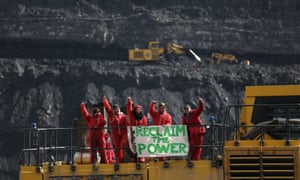| Image: Russell Smith on flickr |
| Let's hope that climate change policy will stop being a political football between the two major parties. |
The policy outlines higher emissions cuts, a return to limited carbon trading, and a move to 50 per cent renewable energy by 2030.
ANU has experts available for comment.
Professor Ken Baldwin, Director, ANU Energy Change Institute
"The recent signing of the Paris CoP agreement in New York was backed by calls for more rapid and concerted action to reduce damaging climate change. Labor has responded by proposing a much-needed acceleration of Australia's emissions reductions to 45 per cent by 2030 via two essential mechanisms: placing a price on carbon through an Emissions Trading Scheme (ETS), and regulating to achieve 50 per cent renewable electricity by 2030.
"In order to undertake the huge investments needed in emissions reduction technology, industry needs long-term certainty in government policy. By creating decadal renewable electricity goals and a well-understood ETS framework, Labor is helping to provide this certainty.
"However, unless there is bipartisan support for an ETS and for renewables, then this certainty will be thrown into disarray. The Coalition and Labor need to work together - not in opposition - otherwise Australia faces international isolation and economic disadvantage by being left behind in this global challenge."
Professor Mark Howden, Director, ANU Climate Change Institute
"The Labor Party climate change action plan provides a comprehensive approach to reducing greenhouse gas emissions so that Australia can play a significant role in meeting the global targets agreed in Paris in December last year.
"But Labor's plan is completely absent of any elements on adaptation - it has only one side of the climate change equation. Climate adaptation is another string to the innovation bow and it will bring major economic, social and environmental advantages if done well.
"To acknowledge the need for climate adaptation does not undermine the positive options in Labor's Plan for reducing emissions. It is simply a practical and pragmatic response to the realities of change as it unfolds.
"A comprehensive climate change plan that delivers fully to the national interest will have both sides of the climate change equation: emission reduction and adaptation."
Associate Professor Frank Jotzo, Director, Centre for Climate Economics & Policy ANU Crawford School of Public Policy
"Labor has provided a comprehensive statement of policy intent. There is now a chance for a serious contest of ideas and proposals, with quite some detail on the table early in the election campaign. Let's hope that climate change policy will stop being a political football between the two major parties.
"The plan's focus on electricity sector transition is well taken. At ANU we have contributed to this debate, and our proposal for a market-based mechanism for exit of coal-fired power stations is taken up in the policy.
"Labor's idea of a stand-alone emissions trading scheme for the power sector is similar to what the government may intend. It is not economically optimal, rather it is fashioned to deal with the difficult politics of the issue. The emissions trading scheme for the broader economy seems geared to help meet the strong national emissions targets through industry-funded purchases of international permits. Before 2020 however the emissions trading scheme would be ineffective and heavy industry would have little incentive for action.
"Fifty per cent renewables by 2030 is possible but would require massive investment. The big open question is what a Labor government would do to get there. This would be left for a review. The government has also announced a climate change policy review for 2017 - perhaps another sign of a gradual convergence at least on some issues."
Dr Paul Burke, ANU Crawford School of Public Policy
"Emissions trading schemes offer a cheap way to reduce emissions. Moving towards emissions trading would be a positive step on the road to decarbonising Australia's economy.
"The plan includes some fresh thinking, such as the idea for an industry-funded mechanism for the retirement of existing coal-fired generators.
"Labor has signalled that their approach would have a quite heavy reliance on emissions offsets, both international and local. There is a good reason why offsets are cheap: they can be of low quality. It would be preferable to move to a system with a more limited role for offsets.
"Australia's climate policy has been politicised and messy. Hopefully a transition to emissions trading is an idea that can win support from all sides of politics."
Professor Andrew Blakers, ANU College of Engineering and Computer Science
"The electricity sector is properly the main focus since it is the largest emissions sector - and will grow to 60 per cent of emissions as cars are electrified and gas heating is displaced by electric-driven heat pumps. Wind and photovoltaics (PV) constitute one quarter each of new generation capacity installed worldwide each year, and constitute all new Australian generation capacity. Costs are now the same as for new-build gas and coal power stations.
"The ALP goal of 50 per cent renewable electricity by 2030 is unambitious - current deployment rates of about one gigawatt (GW) per year each of wind and photovoltaics gets us there. Doubling the current deployment rate to two GW per year each gets us to 80 per cent renewable electricity - and a halving of total greenhouse gas emissions.
"The importance of renewable energy R&D needs emphasis. The Government's new policy severely curtails grants from the Australian Renewable Energy Agency, which will have the effect of severely damaging Australian renewable energy R&D and education."
Link



